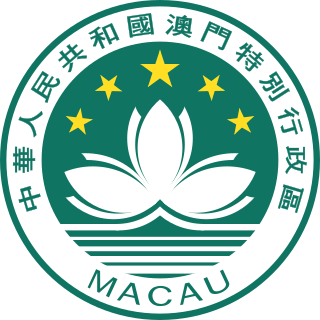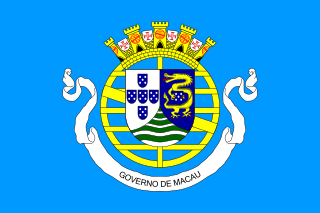Air Macau is the flag carrier of Macau. It operates services to 24 destinations in Mainland China, Indonesia, Japan, Singapore, South Korea, Taiwan, Thailand and Vietnam, from the airline's home base at Macau International Airport. In 2014, Air Macau carried 2.12 million passengers with an average load factor of 68.20% and carried 15,900 tonnes of cargo and mail.

The Legislative Assembly of the Macau Special Administrative Region is the organ of the legislative branch of Macau. It is a 33-member body comprising 14 directly elected members, 12 indirectly elected members representing functional constituencies and 7 members appointed by the chief executive. It is located at Sé.

Chan Meng Kam is a member of the Legislative Assembly of Macau. Chan Meng Kam is a member of the Chinese People's Political Consultative Conference, President of the Macau Paralympic Committee, Chairman of City University of Macau and Huaqiao University.

Leonel Alberto Alves is a member and a former First Secretary of the Legislative Assembly of Macau (1996-2009). In 2005, Alves became a member of the Executive Council of Macau and in 2008, he became a local member of the National Committee of the Chinese People's Political Consultative Conference.

Jason Chao Teng Hei is a social activist and LGBT rights campaigner born in Macau. He was President of the New Macau Association and Director of the satirical newspaper Macau Concealer, one of the few online pro-democracy media in the city. He co-founded activist organisation Macau Conscience and the Rainbow of Macau.

Macau independence is a stance advocating for Macau's independence from the People's Republic of China. In 2016, the topic of Macau independence was brought up due to the controversy over the revision of Legislative Assembly of Macau election law, which is indirectly influenced by the Hong Kong Legislative Council oath-taking controversy. In 2017, different media outlets sensationalized the Macau independence issue; among such media outlets are Global Times and Jornal San Wa Ou from Macau. These groups were criticized by various parties for it. Critics expressed concerns that raising such discussions could turn a non-existent and unpopular topic into reality, comparing it to the way Hong Kong independence became increasingly discussed after being brought up by former Hong Kong Chief Executive Leung Chun-ying A commentary by Radio France Internationale suggested that the Macau independence topic was a narrative fabricated by authorities as a means to suppress opposition. Historically, Portugal attempted to make China recognize Macau's independence during its weakened state following the Opium Wars, but successive Chinese governments have never relinquished sovereignty over Macau.
Legislative elections were held in Macau on 12 September 2021. This legislative election will return 33 members of the Legislative Assembly of Macau, with 14 directly elected by all electorates, 12 indirectly elected by special interest groups and 7 appointed by the Chief Executive 15 days after the announcement of the election results.
Chief Executive elections were held in Macau on 26 July 2009 for the third term of the Chief Executive of Macau (CE), the highest office of the Macau Special Administrative Region. Fernando Chui was elected without contest after incumbent Chief Executive Edmund Ho was ineligible for re-election due to having served two terms.
The 2019 Macanese Chief Executive election was held on 25 August 2019 for the 5th term of the Chief Executive of Macau (CE), the highest office of the Macau Special Administrative Region. Incumbent Chief Executive Fernando Chui, who was re-elected once already, was not eligible to run for the office under Macao Basic Law, the mini-constitution of the territory. Ho Iat-seng, former President of the Legislative Assembly of Macau, won as the sole candidate of the election.

The Association of Synergy of Macao, often shortened to Synergy of Macao, is a centrist political party in Macau. It is represented in the Legislative Assembly.
Macao Civic Power, or in short Civic Power, is a centrist political party in Macau.

The Women's General Association of Macau, often shortened to the Women's Association (婦聯), is a pro-Beijing political party in Macau. It has two seats in the Legislative Assembly.

The General Union of Neighbourhood Associations of Macau, sometimes shortened to the GUNA or the Neighbourhood Union, is a pro-Beijing political party in Macau that is represented in the Legislative Assembly.
Tommy Chan Kai-kit, born Chio Ho-cheong, is a Macanese businessman who was a member of the Legislative Assembly of Macau and of the Chinese People's Political Consultative Conference. Following the revelation that Chan was the mastermind behind the fraud case of Guangnan Holding, he was wanted by Hong Kong's Independent Commission Against Corruption (ICAC). His whereabouts have since remained unknown.
Legislative elections were held in Portuguese Macau on 9 October 1988, returning 17 members of the Legislative Assembly of Macau, with six directly elected by electorates, six indirectly elected by special interest groups and five appointed by the Governor.
Legislative elections were held in Portuguese Macau on 15 August 1984. There were 17 members of the Legislative Assembly of Macau up for election: six directly elected by electorates, six indirectly elected by special interest groups and five appointed by the Governor of Macau.
Legislative elections were held in Portuguese Macau on 28 September 1980, returning 17 members of the Legislative Assembly of Macau, with 6 directly elected by electorates, 6 indirectly elected by special interest groups and 5 appointed by the Governor.

Democratic Centre of Macau is a centre-left progressive Portuguese political association based in Macau, then a Portuguese colony. Founded on 30 April 1974, five days after the Carnation Revolution, it remains the only registered political association in Macau, different from the better-known civic associations.
Association for the Defense of Macau Interests was a Portuguese conservative and localist political association based in Macau. Founded on 19 June 1974 by Delfino José Rodrigues Ribeiro and Carlos Augusto Corrêa Paes d’Assumpção, ADIM collaborated politically with CDS in Portugal, as both shared similar ideology








